
An Introduction to NanosomesÔ
from
Elsom Research Innovative Biotechnologies
Nanosomes™ are the key technology implemented in Nanosomin™, Equisomin™, and other Elsom Research cosmeceuticals. In this document, we provide an illustrated basic explanation of the structure and function of Nanosomes™, using our Nanosomin™ skincare serum to illustrate the concepts discussed.
This document is an introduction; much more information is available on our website:
Information about purchasing Nanosomin™ is available at http://www.elsomresearch.com/shopping/products/antiaging.htm.
Information about Nanosomes™ as an option in custom formulation or private label manufacturing projects is available at http://www.elsomresearch.com/businesses/nanotechnology.htm.
To learn more about these ideas, you are invited to contact us:
by email at innovation@elsomresearch.com.
by telephone at 210.493.5225.
INTRODUCTION:
About Nanosomin™ Serum
Nanosomin™ Serum, from Elsom Research Co., Inc., is a novel and complex topical skin treatment based on anti-aging research. It is the only product of its kind. With double emulsion technology at the core of its operating mechanism, Nanosomin™ Serum is comprised of interactive Nanosomes™ carrying and delivering anabolic factors, vitamins, anti-oxidants, and moisturizers to the skin.
What is Nanosomin™ Serum?
Why is it so potent?
Why is it so different?
Why is it so special?
What are Nanosomes™ ?
Nanosomin™ Serum is based on sound science, designed to provide skin with the best possible support for good health which leads to a good appearance.
To explain how Nanosomin™ Serum works, we will have to subject you to a four-part scientific crash course in the biochemistry of your body. Specifically, to understand why Nanosomin™ Serum is so important for your skin, you will have to know a little about the properties of some lipids and their connection with liposomes and cell membranes. Our course of study on the biochemistry of Nanosomin™ Serum is arranged as follows:
Part I Introduction to Lipids, Phospholipids, Liposomes, Nanosomes™, and Cell Membranes
Part II Liposome Function Depends on Size, or, "Smaller is Better"
Part III The Process of Cellular Aging
Part IV The Process of Cellular Rejuvenation
PART I:
Introduction to Lipids, Phospholipids, Liposomes, Nanosomes™, and Cell Membranes
What are lipids?
Lipids are a group of chemical compounds (such as oils and waxes) which occur in living organisms and are only sparingly soluble in water.
What are phospholipids?
Phospholipids are a special group of lipids containing phosphate. Phospholipids are the building blocks of liposomes and cell membranes. Your skin, like the rest of your body, is composed of cells whose membranes must be healthy and strong in order for it to function properly. Phospholipids make this possible.
What do phospholipids have to do with cell membranes?Lipids in general are hydrophobic, also called non-polar; this means they cannot be dissolved in water. However, the phosphate group in phospholipids is hydrophilic, also called polar; phospholipids can be dissolved in water. Phospholipids are the major building blocks of some naturally-occuring structures such as cell membranes and some manufactured structures such as liposomes and Nanosomes™. The major groups of phospholipids are:
The following picture illustrates some of the special structural, chemical, and physical characteristics of phospholipids.

When phospholipids are immersed in water they arrange themselves so that their hydrophilic regions point toward the water and their hydrophobic regions point away from the water. This unique structure of phospholipids making them simultaneously hydrophilic and hydrophobic, is the key to their ability to organize as a double layer (bilayer formation) when immersed in water. The interaction and rejection forces between phospholipids and water cause phospholipids to organize themselves as bilayers.
The following picture illustrates the formation of a phospholipid bilayer structure.
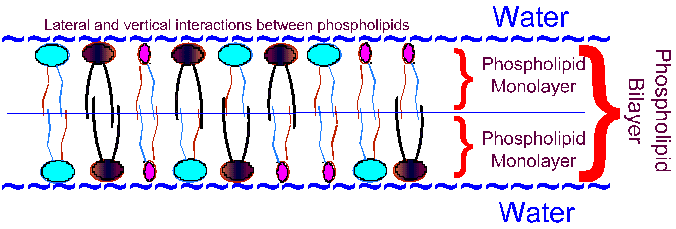
What do phospholipids have to do with liposomes?
Liposomes are small lipid-based bodies; -some refers to the Greek word for "body". Phospholipids are the core structure in the formation of liposomes and cell membranes.Phospholipid bilayers forming into a liposome or a cell membrane can be seen in the next pictures.
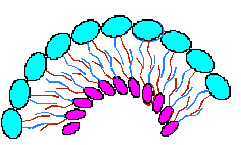 |
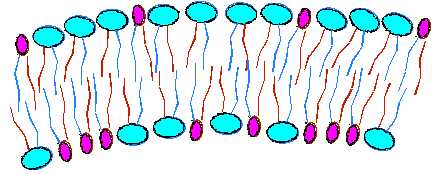 |
| Formation of a phospholipid bilayer into a liposome. | Formation of a phospholipid bilayer into a cell membrane. |
What do liposomes have to do with Nanosomes™?
The structure of liposomes is similar to the structure of cell membranes.
At Elsom Research, we invented nanotechnology-enhanced vesicles that, like cell membranes and liposomes, are constructed of phospholipid bilayers. We called these very small, nanotechnology-enhanced vesicles "Nanosomes™" .
A comparison of the two-dimensional structure of a cell membrane and Nanosomes™ is shown in the following pictures. Their sizes are not to scale.
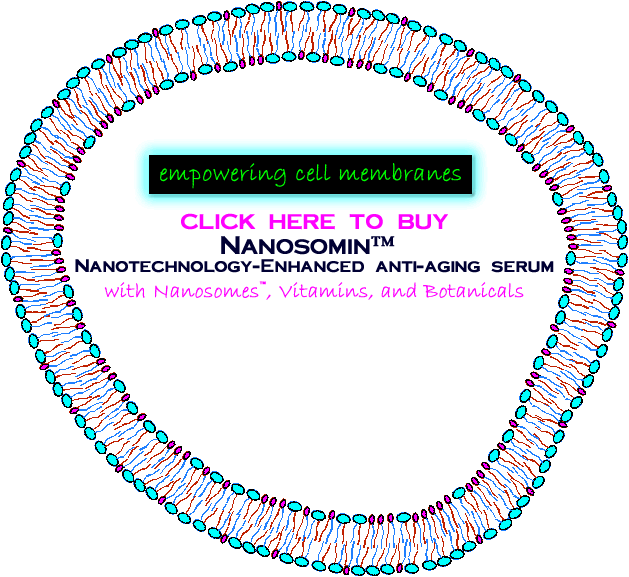
|
|
| Two-dimensional view of cell membrane structure. | Two-dimensional view of Nanosomes™ structure. |
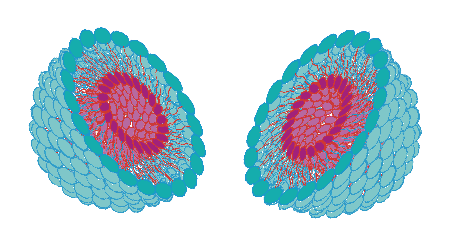
Nanosomes™ can encapsulate and transport water-soluble ingredients in their polar cavity and oil-soluble ingredients in their hydrophobic cavity.
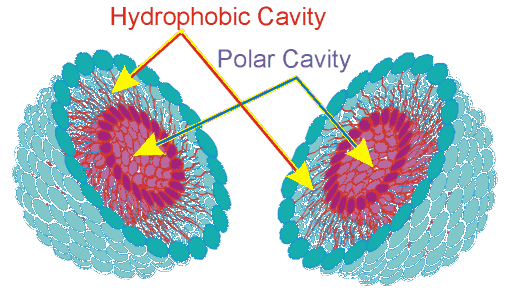
Nanosomes™ can contain and mobilize water-soluble materials as well as oil-soluble materials in specific cavities inside themselves.
Part II:
Liposome Function Depends on Size, or, "Smaller
is Better"
What are the differences between large liposomes, small liposomes, and Nanosomes™?
Large, multiple-layer liposomes are actually liposomes within liposomes. They have a limited ability to penetrate into skin layers or, when injected, to travel through narrow blood vessels. The materials that are entrapped in the inner layers of these liposomes are neither accessible nor releasable for practical applications.
Large liposomes are easy to make. All that is required is to shake phospholipids in water. These liposomes have very limited functions and are usually made of commercial lecithin, commonly found in food products. Commercial lecithin’s main function is as an emulsifying agent, improving the ability of oil and water to remain mixed.
Our very small, single-bilayer Nanosomes™ differ from large liposomes in some major ways. They are constructed from the highest possible quality of ingredients, and they are created using a special technique.
While large liposomes may be constructed from commercial lecithin, our Nanosomes™ are created of higher-quality material. The material we use to create our Nanosomes™ has an extremely high percentage of phosphatidylcholine (PC), one of the essential components of cell membranes.
Very small, single-bilayer vesicles (Nanosomes™) are very difficult to make, so our Nanosomes™ are created in a special way. The process of creating Nanosomes™ requires subjecting large, multiple-layer liposomes to ultrasonic energy. This process is very long, extremely delicate, and is done in small batches. Nanosomes™ can easily penetrate into small blood vessels by intravenous injection; they can also penetrate into (but not through) the skin by topical application. Their content, material intentionally entrapped inside them, is efficiently transported and can be delivered to desired targets such as cells.
The following picture illustrates some of the common structural differences between large liposomes and small, single-bilayer vesicles (Nanosomes™).
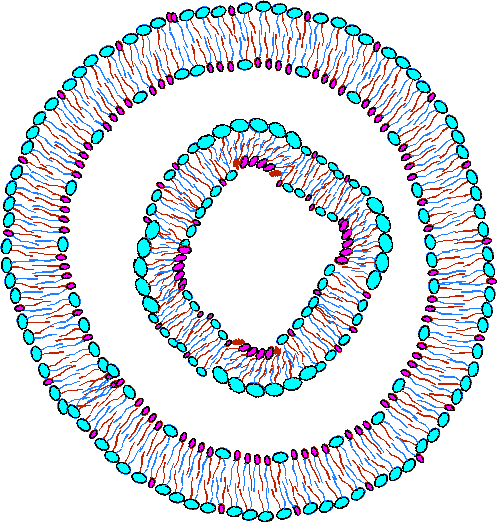
|
|
| Large, multiple-bilayer liposome. | Very small, single-bilayer Nanosomes™. |
High Phosphatidylcholine Content is Better
Since liposomes made with various phospholipid types can contain, encapsulate, and mobilize water-soluble materials and oil-soluble materials, what is so special about Nanosomes™ made with high purity phosphatidylcholine (PC) rather than liposomes made with the inexpensive alternative, commercial lecithin?
Nanosomes™ with high-purity PC not only deliver encapsulated ingredients to cells but also deliver cells' own building block, phosphatidylcholine (PC) itself. This unique feature of high-purity PC Nanosomes™ renders them the most powerful tool available for combating cellular aging.
To understand the importance of Nanosomes™ containing high-purity PC, please continue reading.
![]() Part
III will introduce you to some of the major events occurring during the
aging process of cells.
Part
III will introduce you to some of the major events occurring during the
aging process of cells.
![]() Part
IV will explain how high-purity PC Nanosomes™ reverse
the aging process in old cells.
Part
IV will explain how high-purity PC Nanosomes™ reverse
the aging process in old cells.
Part III:
The Process of Cellular Aging
During the aging process, the level of phosphatidylcholine (PC) in cell membranes is diminished and the level of sphingomyelin (SM) increases.
In the images below, PC is represented by blue-headed phospholipids and SM is represented by black-headed phospholipids.
Part IV:
The Process of Cellular Rejuvenation
High purity PC Nanosomes™ can restore the levels and distribution of phospholipids in old cells to the characteristics they had as young cells. They do this by interacting with cell membranes and causing them to reach a new equilibrium. For this reason, the Elsom Research cosmeceuticals product line which includes Nanosomin™ Serum has been named "New Equilibrium".
This process can only be carried out when high purity PC is utilized in constructing the Nanosomes™. The effective PC purity should be at least 70% but is extremely potent if it is 90% or higher, as it is in Nanosomin™ Serum.
|
|
A fresh Nanosome™ made with very high content (over 90%) of PC is approaching an old cell membrane. The aging cell membrane has lost many of its "good" PC molecules (represented by the phospholipids with blue head groups) which have been replaced by "bad" SM molecules (represented by the phospholipids with black head groups). |
|
|
The Nanosome™ and the aging cell membrane begin moving toward a New Equilibrium, a process in which molecules from the cell membrane will be exchanged with molecules from the Nanosome™. The bad SM molecule from the aging cell is being pulled out from the cell membrane, and the good PC molecule is being pulled out of the Nanosome™. |
|
|
The SM molecule originating in the aging cell attempts to achieve equilibrium by reaching toward the Nanosome™. The PC molecule originating in the Nanosome™ attempts to reach equilibrium by moving toward the aging cell membrane. |
|
|
The molecules exchanged between the Nanosome™ and the cell membrane are being repositioned in their respective new destinations. |
|
|
Application of Nanosomin™ Serum creates an environment in which many Nanosome™ are available. The large number of Nanosomes™ provides a very large surface area relative to the surface area of the aging cell membranes, ensuring that there is material available for use in achieving a new equilibrium. The
end process provides a cell that has reached a new
equilibrium and
is thus rejuvenated biologically, chemically, and physically. A rejuvenated
cell is replenished
with PC molecules and cleaned of SM molecules. |
We hope this explanation is useful to you in evaluating the uniqueness and novelty of Nanosomin™ Serum. The sound science behind Nanosomin™ Serum and all our products provides you with the utmost in skin care today.
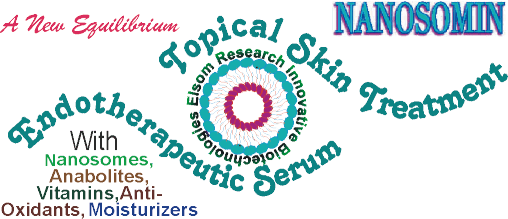
![]()
This document and all material contained in it is copyright 1996-2011, Elsom Research Co., Inc.
revised 2011-04-02 to move text out of images, improving machine transation
revised 2007-10-17 to relocate cosmeceuticals shop
revised 2007-09-05 to add image titles for Firefox browser
revised 2007-09-26 to add link to Nanosomin™ Serum sale page